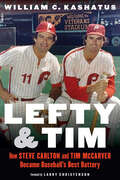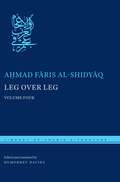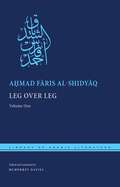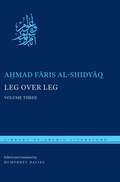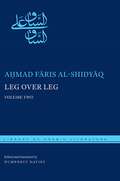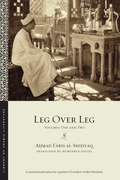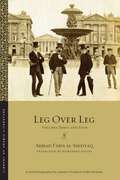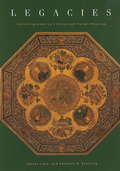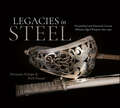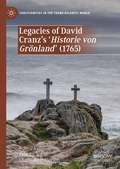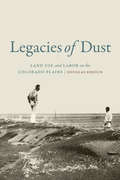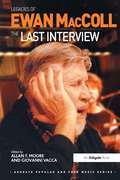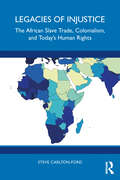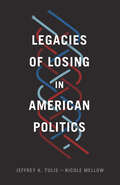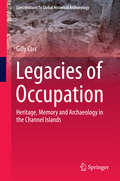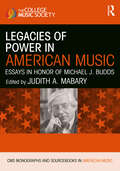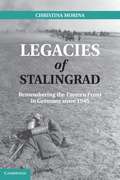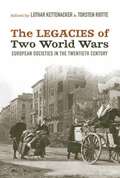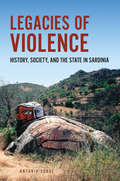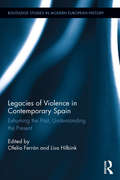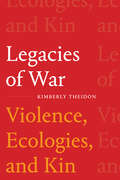- Table View
- List View
Lefty and Tim: How Steve Carlton and Tim McCarver Became Baseball's Best Battery
by William C. KashatusLefty and Tim is the dual biography of Hall of Fame pitcher Steve &“Lefty&” Carlton and catcher Tim McCarver, detailing their relationship from 1965, when they played with the St. Louis Cardinals, through 1980, when they played for the Philadelphia Phillies. Along the way McCarver became Carlton&’s personal catcher, and together they became the best battery in baseball in the mid-to-late 1970s. At first glance Carlton and McCarver appear like an odd couple: McCarver was old school, Carlton new age. At the beginning of his career, McCarver believed that the catcher called the pitches, encouraged the pitcher when necessary, and schooled the pitcher when he deviated from the game plan. But Lefty, who pioneered the use of meditation and martial arts in baseball, was stubborn too. He wanted to control pitch selection. Over time, Carlton and McCarver developed a strong bond off the diamond that allowed them to understand and trust each other. In the process, Steve Carlton became one of the greatest left-handers in the history of Major League Baseball, an achievement that would not have been possible without Tim McCarver as his catcher. Not only did McCarver mentor Carlton as a young hurler with the Cardinals, but he helped resurrect Carlton&’s career when they were reunited in Philadelphia midseason in 1975. Carlton won his second Cy Young Award with McCarver behind the plate in 1977. Told in the historical context of the time they played the game, Lefty and Tim recounts the pair&’s time in the tumultuous sixties, with the racial integration of the St. Louis Cardinals and the dominance of pitching, and in the turbulent seventies, characterized by MLB&’s labor tensions, the arrival of free agency, and the return of the lively ball that followed the lowering of the pitcher&’s mound in 1969.
Leg over Leg: Volume Four (Library of Arabic Literature #30)
by Aḥmad Fāris al-ShidyāqFinalist for the 2016 National Translation Award given by the American Literary Translators' AssociationThe life, birth, and early years of 'the Fariyaq'—the alter ego of the Arab intellectual Ahmad Faris al-ShidyaqLeg over Leg recounts the life, from birth to middle age, of ‘the Fariyaq,’ alter ego of Ahmad Faris al-Shidyaq, a pivotal figure in the intellectual and literary history of the modern Arab world. The always edifying and often hilarious adventures of the Fariyaq, as he moves from his native Lebanon to Egypt, Malta, Tunis, England and France, provide the author with grist for wide-ranging discussions of the intellectual and social issues of his time, including the ignorance and corruption of the Lebanese religious and secular establishments, freedom of conscience, women’s rights, sexual relationships between men and women, the manners and customs of Europeans and Middle Easterners, and the differences between contemporary European and Arabic literatures. Al-Shidyaq also celebrates the genius and beauty of the classical Arabic language.Akin to Sterne and Rabelais in his satirical outlook and technical inventiveness, al-Shidyaq produced in Leg over Leg a work that is unique and unclassifiable. It was initially widely condemned for its attacks on authority, its religious skepticism, and its “obscenity,” and later editions were often abridged. This is the first English translation of the work and reproduces the original Arabic text, published under the author’s supervision in 1855.
Leg over Leg: Volume One (Library of Arabic Literature #6)
by Aḥmad Fāris al-ShidyāqFinalist for the 2016 National Translation Award given by the American Literary Translators' AssociationThe life, birth, and early years of 'the Fariyaq'—the alter ego of the Arab intellectual Ahmad Faris al-ShidyaqLeg over Leg recounts the life, from birth to middle age, of ‘the Fariyaq,’ alter ego of Ahmad Faris al-Shidyaq, a pivotal figure in the intellectual and literary history of the modern Arab world. The always edifying and often hilarious adventures of the Fariyaq, as he moves from his native Lebanon to Egypt, Malta, Tunis, England and France, provide the author with grist for wide-ranging discussions of the intellectual and social issues of his time, including the ignorance and corruption of the Lebanese religious and secular establishments, freedom of conscience, women’s rights, sexual relationships between men and women, the manners and customs of Europeans and Middle Easterners, and the differences between contemporary European and Arabic literatures. Al-Shidyaq also celebrates the genius and beauty of the classical Arabic language.Akin to Sterne and Rabelais in his satirical outlook and technical inventiveness, al-Shidyaq produced in Leg Over Leg a work that is unique and unclassifiable. It was initially widely condemned for its attacks on authority, its religious skepticism, and its “obscenity,” and later editions were often abridged. This is the first English translation of the work and reproduces the original Arabic text, published under the author’s supervision in 1855.
Leg over Leg: Volume Three (Library of Arabic Literature #34)
by Aḥmad Fāris al-ShidyāqFinalist for the 2016 National Translation Award given by the American Literary Translators' AssociationThe life, birth, and early years of 'the Fariyaq'—the alter ego of the Arab intellectual Ahmad Faris al-ShidyaqLeg over Leg recounts the life, from birth to middle age, of ‘the Fariyaq,’ alter ego of Ahmad Faris al-Shidyaq, a pivotal figure in the intellectual and literary history of the modern Arab world. The always edifying and often hilarious adventures of the Fariyaq, as he moves from his native Lebanon to Egypt, Malta, Tunis, England and France, provide the author with grist for wide-ranging discussions of the intellectual and social issues of his time, including the ignorance and corruption of the Lebanese religious and secular establishments, freedom of conscience, women’s rights, sexual relationships between men and women, the manners and customs of Europeans and Middle Easterners, and the differences between contemporary European and Arabic literatures. Al-Shidyaq also celebrates the genius and beauty of the classical Arabic language.Akin to Sterne and Rabelais in his satirical outlook and technical inventiveness, al-Shidyaq produced in Leg over Leg a work that is unique and unclassifiable. It was initially widely condemned for its attacks on authority, its religious skepticism, and its “obscenity,” and later editions were often abridged. This is the first English translation of the work and reproduces the original Arabic text, published under the author’s supervision in 1855.
Leg over Leg: Volume Two (Library of Arabic Literature #27)
by Aḥmad Fāris al-ShidyāqFinalist for the 2016 National Translation Award given by the American Literary Translators' AssociationThe life, birth, and early years of 'the Fariyaq'—the alter ego of the Arab intellectual Ahmad Faris al-ShidyaqLeg over Leg recounts the life, from birth to middle age, of ‘the Fariyaq,’ alter ego of Ahmad Faris al-Shidyaq, a pivotal figure in the intellectual and literary history of the modern Arab world. The always edifying and often hilarious adventures of the Fariyaq, as he moves from his native Lebanon to Egypt, Malta, Tunis, England and France, provide the author with grist for wide-ranging discussions of the intellectual and social issues of his time, including the ignorance and corruption of the Lebanese religious and secular establishments, freedom of conscience, women’s rights, sexual relationships between men and women, the manners and customs of Europeans and Middle Easterners, and the differences between contemporary European and Arabic literatures. Al-Shidyaq also celebrates the genius and beauty of the classical Arabic language.Akin to Sterne and Rabelais in his satirical outlook and technical inventiveness, al-Shidyaq produced in Leg over Leg a work that is unique and unclassifiable. It was initially widely condemned for its attacks on authority, its religious skepticism, and its “obscenity,” and later editions were often abridged. This is the first English translation of the work and reproduces the original Arabic text, published under the author’s supervision in 1855.
Leg over Leg: Volumes One and Two (Library of Arabic Literature #1)
by Aḥmad Fāris al-ShidyāqFinalist for the 2016 National Translation Award given by the American Literary Translators' AssociationThe life, birth, and early years of 'the Fariyaq'—the alter ego of the Arab intellectual Ahmad Faris al-ShidyaqLeg over Leg recounts the life, from birth to middle age, of “the Fariyaq,” alter ego of Ahmad Faris al-Shidyaq, a pivotal figure in the intellectual and literary history of the modern Arab world. The always edifying and often hilarious adventures of the Fariyaq, as he moves from his native Lebanon to Egypt, Malta, Tunis, England, and France, provide the author with grist for wide-ranging discussions of the intellectual and social issues of his time, including the ignorance and corruption of the Lebanese religious and secular establishments, freedom of conscience, women’s rights, sexual relationships between men and women, the manners and customs of Europeans and Middle Easterners, and the differences between contemporary European and Arabic literatures, all the while celebrating the genius and beauty of the classical Arabic language.Volumes One and Two follow the hapless Fariyaq through his youth and early education, his misadventures among the monks of Mount Lebanon, his flight to the Egypt of Muhammad 'Ali, and his subsequent employment with the first Arabic daily newspaper—during which time he suffers a number of diseases that parallel his progress in the sciences of Arabic grammar, and engages in amusing digressions on the table manners of the Druze, young love, snow, and the scandals of the early papacy. This first book also sees the list—of locations in Hell, types of medieval glue, instruments of torture, stars and pre-Islamic idols—come into its own as a signature device of the work.Akin to Sterne and Rabelais in his satirical outlook and technical inventiveness, al-Shidyaq produced in Leg over Leg a work that is unique and unclassifiable. It was initially widely condemned for its attacks on authority, its religious skepticism, and its “obscenity,” and later editions were often abridged. This is the first complete English translation of this groundbreaking work.
Leg over Leg: Volumes Three and Four (Library of Arabic Literature #9)
by Aḥmad Fāris al-ShidyāqFinalist for the 2016 National Translation Award given by the American Literary Translators' AssociationThe life, birth, and early years of 'the Fariyaq'—the alter ego of the Arab intellectual Ahmad Faris al-ShidyaqLeg over Leg recounts the life, from birth to middle age, of “the Fariyaq,” alter ego of Ahmad Faris al-Shidyaq, a pivotal figure in the intellectual and literary history of the modern Arab world. The always edifying and often hilarious adventures of the Fariyaq, as he moves from his native Lebanon to Egypt, Malta, Tunis, England, and France, provide the author with grist for wide-ranging discussions of the intellectual and social issues of his time, including the ignorance and corruption of the Lebanese religious and secular establishments, freedom of conscience, women’s rights, sexual relationships between men and women, the manners and customs of Europeans and Middle Easterners, and the differences between contemporary European and Arabic literatures, all the while celebrating the genius and beauty of the classical Arabic language.Volumes Three and Four see the peripatetic Fariyaq fall in love and convert to Catholicism for twenty-four hours in order to marry. Although the narrative revolves around a series of debates over the nature of male-female relationships, opportunities also arise for disquisitions on the physical and moral significance of such diverse topics as the buttocks, the unreliability of virginity tests, and the human capacity for self-delusion. Lengthy stays in England and France allow for animadversions on the table manners and sexual aberrations of their citizens, but the discussion, whether it involve dance-halls, pleasure gardens, or poetry, almost always ends up returning to gender relations.Akin to Sterne and Rabelais in his satirical outlook and technical inventiveness, al-Shidyaq produced in Leg over Leg a work that is unique and unclassifiable. It was initially widely condemned for its attacks on authority, its religious skepticism, and its “obscenity,” and later editions were often abridged. This is the first complete English translation of this groundbreaking work.
Legacies
by Janet DaileyDebutante Diane Parmalee was a U.S. Army officer's daughter; Lije Stuart was the handsome Harvard educated son of the part-Cherokee Stuart clan. Nothing, not even their different worlds, seemed able to stop their love--except a tragic legacy. The wealthy Stuart family burned with the memory of the government's forced march of the Cherokee on the Trail of Tears. Now, as the nation exploded in civil war, Lije's family split in a violent feud, driving Lije to do the one thing Diane could not forgive-- fight for the South. At his father's side, Lije was riding away on a journey of blood and sorrow, perhaps forever. The lovers' only hope was another legacy: a passion strong enough to reunite them before betrayal and death claimed their hearts...
Legacies
by Janet DaileyThe love between a Union officer&’s daughter and a Cherokee man is threatened by the Civil War in this sweeping romance by a New York Times–bestselling author. A &“passionate tale of Native American history, family feuds, and romance,&” this saga by a multimillion-selling author begins in Springfield, Massachusetts, in May 1860 (Booklist). The Civil War looms as nineteen-year-old Diane Parmelee, spirited daughter of a Union officer, reunites with her former childhood sweetheart, the broodingly handsome Cherokee Lije Stuart. Passions flare once again between the blond beauty and the accomplished Harvard University law student. But as two hearts come together, the promise of marriage is short-lived. Despite her undying love, Diane can&’t bring herself to accept Lije&’s conditions for their future. Lije expects them to build a life where his proud allegiance lie: on the plantations of his Cherokee family, and in turn, the Confederacy. But for Lije and Diane, it&’s just the beginning of a conflict that will tear families apart and reopen the wounds of violent rivalries born out of the historic Trail of Tears—and will end only when divided loyalties and revenge threaten to shatter the meaning of heritage and honor. Through it all, only true love can hope to survive. Legacies was previously published as American Destiny.
Legacies
by Steven Lubar Kathleen M. KendrickThe Smithsonian Institution has been America's museum since 1846. What do its vast collections -- from the ruby slippers to a piece of Plymouth Rock, first ladies' gowns to patchwork quilts, a Model T Ford to a customized Ford LTD low rider -- tell Americans about themselves? In this lavishly illustrated guide to the Smithsonian's National Museum of American History, Steven Lubar and Kathleen M. Kendrick tell the stories behind more than 250 of the museum's treasures, many of them never before photographed for publication. These stories not only reveal what America as a nation has decided to save and why but also speak to changing visions of national identity.As the authors demonstrate, views of history change over time, methods of historical investigation evolve and improve, and Americas' understand of the past matures. Shifts in focus and attitude lie at the hearth of Legacies, which is organized around four concepts of what a national museum of history can be: a treasure house, a shrine to the famous, a palace of progress, and a mirror of the nation. Thus, the museum collects cherished or precious objects, houses celebrity memorabilia, documents technological advances, and reflects visitors' own lives. Taking examples from science and technology, politics, decorative arts, military history, ethnic heritage, popular culture and everyday life, the authors provide historical context for the work of the Smithsonian and shed new light on what is important, and who is included, in American history. Throughout its history, Lubar and Kendrick conclude, the museum has played a vital role in both shaping and reflecting America's sense of itself as a nation.
Legacies in Steel: Personalized and Historical German Military Edged Weapons, 1800–1990 (Latin America at War)
by Hermann Hampe Rick DauzatNearly 100 German military edged weapons are presented in this sumptuously photographed volume featuring information about their owners. Spanning nearly two hundred years, Legacies in Steel is an in-depth photographic study of historical edged weapons from the German military. The elegant details of each selection are displayed in close-up detail. Many of these weapons belonged to nobility, aristocrats, high-ranking military personnel as well as soldiers and seamen. Where possible, the careers and exploits of these former owners are highlighted, bringing both personal and historical context to these beautifully crafted artifacts. By the 19th century, swords and daggers were no longer effective fighting weapons, but they maintained their popularity in Western Europe as uniform regalia. They were carried as a symbol of authority, achievement, and most importantly, honor. These weapons were produced with great skill and at high cost, requiring the skill of specialized artisans, often using precious metals and ivory, elaborate hand engraving and chiseling. Blades were fabricated of the highest quality Solingen steel. Folded steel Damascus blades were also painstakingly produced. Many examples are unique and border on singular works of art.
Legacies of British Slave-Ownership
by Catherine Hall Catherine Hall Nicholas Draper Keith McClelland Katie Donington Rachel Lang Nicholas Draper Keith Mcclelland Katie DoningtonThis book re-examines the relationship between Britain and colonial slavery in a crucial period in the birth of modern Britain. Drawing on a comprehensive analysis of British slave-owners and mortgagees who received compensation from the state for the end of slavery, and tracing their trajectories in British life, the volume explores the commercial, political, cultural, social, intellectual, physical and imperial legacies of slave-ownership. It transcends conventional divisions in history-writing to provide an integrated account of one powerful way in which Empire came home to Victorian Britain, and to reassess narratives of West Indian 'decline'. It will be of value to scholars not only of British economic and social history, but also of the histories of the Atlantic world, of the Caribbean and of slavery, as well as to those concerned with the evolution of ideas of race and difference and with the relationship between past and present.
Legacies of David Cranz's 'Historie von Grönland' (Christianities in the Trans-Atlantic World)
by Christina Petterson Felicity JenszThis book brings together interdisciplinary scholars from history, theology, folklore, ethnology and meteorology to examine how David Cranz’s Historie von Grönland (1765) resonated in various disciplines, periods and countries. Collectively the contributors demonstrate the reach of the book beyond its initial purpose as a record of missionary work, and into secular and political fields beyond Greenland and Germany. The chapters also reveal how the book contributed to broader discussions and conceptualizations of Greenland as part of the Atlantic world. The interdisciplinary scope of the volume allows for a layered reading of Cranz’s book that demonstrates how different meanings could be drawn from the book in different contexts and how the book resonated throughout time and space. It also makes the broader argument that the construction of the Artic in the eighteenth century broadened our understanding of the Atlantic.
Legacies of Dust: Land Use and Labor on the Colorado Plains
by Douglas SheflinThe Dust Bowl of the 1930s was the worst ecological disaster in American history. When the rains stopped and the land dried up, farmers and agricultural laborers on the southeastern Colorado plains were forced to adapt to new realities. The severity of the drought coupled with the economic devastation of the Great Depression compelled farmers and government officials to combine their efforts to achieve one primary goal: keep farmers farming on the Colorado plains. In The Legacies of Dust Douglas Sheflin offers an innovative and provocative look at how a natural disaster can dramatically influence every facet of human life. Focusing on the period from 1929 to 1962, Sheflin presents the disaster in a new light by evaluating its impact on both agricultural production and the people who fueled it, demonstrating how the Dust Bowl fractured Colorado’s established system of agricultural labor. Federal support, combined with local initiative, instituted a broad conservation regime that facilitated production and helped thousands of farmers sustain themselves during the difficult 1930s and again during the drought of the 1950s. Drawing from western, environmental, transnational, and labor history, Sheflin investigates how the catastrophe of the Dust Bowl and its complex consequences transformed the southeastern Colorado agricultural economy.
Legacies of Empire
by Sandra Halperin Ronen Palan Halperin, Sandra and Palan, RonenThe nation-state is a fairly recent historical phenomenon. Human history over the past two to four millennia has been dominated by empires, and the legacies of these empires continues to shape the contemporary world in ways that are not always recognised or fully understood. Much research and writing about European colonial empires has focused on relations between them and their colonies. This book examines the phenomenon of empire from a different perspective. It explores the imprint that imperial institutions, organisational principles, practices, and logics have left on the modern world. It shows that many features of the contemporary world - modern armies, multiculturalism, globalised finance, modern city-states, the United Nations - have been profoundly shaped by past empires. It also applies insights about the impact of past empires to contemporary politics and considers the long-term institutional legacies of the American 'empire'.
Legacies of Ewan MacColl: The Last Interview (Ashgate Popular and Folk Music Series)
by Giovanni VaccaEwan MacColl is widely recognized as a key figure in the English folk revival, who tried to convey traditional music to a mass audience. Dominant in the movement during the 1950s and much of the 1960s, his position has come under attack in more recent years from some scholars. While it would be arrogant to claim to 'set the record straight', this book will contribute significantly to the debate surrounding MacColl's importance. MacColl gave two extended interviews with co-editor Giovanni Vacca in 1987 and 1988, not long before his death, and these provide the impetus for a re-examination of his methods, his politics and his aesthetic aims. The book also provides critical overviews of MacColl's activities in the revival and of his practices, particularly as writer and singer. The time is ripe for such a contribution, following Peter Cox's study of the Radio Ballads, and in the context of biographies by Joan Littlewood and Frankie Armstrong. The contributions locate MacColl in his own historical context, attempting to understand some of the characteristic techniques through which he was able to write and sing such extraordinary songs, which capture so well for others the detail and flavour of their lives. Great emphasis is placed on the importance of seeing MacColl as not only a British, but a European folk activist, through discussion of his hitherto barely known work in Italy, enabling a re-contextualization of his work within a broader European context. The interviews themselves are fluent and fascinating narrations in which MacColl discusses his life, music, and experiences in the theatre and in the folk music revival as well as with a series of issues concerning folk music, politics, history, language, art and other theoretical issues, offering a complete description of all the repertories of the British Isles. Peggy Seeger contributes a Foreword to the collection.
Legacies of Injustice: The African Slave Trade, Colonialism, and Today’s Human Rights
by Steve Carlton-FordThis book examines the impact of the African slave trade and colonialism on political, civil, economic, social, and environmental human rights. Using multiple combined data sets, the book demonstrates that many contemporary human rights issues stem from the impact of the African slave trade and subsequent colonialism as well as the disruption of economic and political development in colonies.Unlike other books concerning human rights, this book views contemporary human rights issues from both historical and sociological vantage points. This important book will be of interest to students studying in courses covering human rights, Africa and Africana studies and history, comparative ethnic studies, historical sociology, and global studies of the African slave trade.
Legacies of Losing in American Politics (Chicago Studies in American Politics)
by Jeffrey K. Tulis Nicole MellowAmerican politics is typically a story about winners. The fading away of defeated politicians and political movements is a feature of American politics that ensures political stability and a peaceful transition of power. But American history has also been built on defeated candidates, failed presidents, and social movements that at pivotal moments did not dissipate as expected but instead persisted and eventually achieved success for the loser’s ideas and preferred policies. With Legacies of Losing in American Politics, Jeffrey K. Tulis and Nicole Mellow rethink three pivotal moments in American political history: the founding, when anti-Federalists failed to stop the ratification of the Constitution; the aftermath of the Civil War, when President Andrew Johnson’s plan for restoring the South to the Union was defeated; and the 1964 presidential campaign, when Barry Goldwater’s challenge to the New Deal order was soundly defeated by Lyndon B. Johnson. In each of these cases, the very mechanisms that caused the initial failures facilitated their eventual success. After the dust of the immediate political defeat settled, these seemingly discredited ideas and programs disrupted political convention by prevailing, often subverting, and occasionally enhancing constitutional fidelity. Tulis and Mellow present a nuanced story of winning and losing and offer a new understanding of American political development as the interweaving of opposing ideas.
Legacies of Occupation
by Gilly CarrThis book explores the way in which the legacy of the German occupation of the Channel Islands has been turned into heritage (or, conversely, neglected) over the last 70 years. Once seen as the 'taint of the mark of the beast', the perception of much of what the Germans left behind has slowly changed from being despised and reviled, buried underground or dumped at sea, to being reclaimed, restored, highly valued and treated as 'heritage'. This book examines the journey of various aspects of this heritage, exploring the role of each post-war generation in picking at the scar of occupation, refusing to let it heal or fade. By discovering and interpreting anew their once-hated legacy, each generation of Channel Islanders has changed the resulting collective memory of a period which is rapidly moving to the edge of living memory. It includes the first in-depth investigation into the multiple aspects of heritage of occupation of a single place and will offer comparative material for other heritage professionals who work with similar material throughout Europe and in other post-occupation areas. It will explore the complex ethical issues faced by anyone who works with the legacy or heritage of Nazism, seeking to understand how and why the Channel Islands have responded in the way that they have and asking how unique - or typical for formerly-occupied Europe - their response has been.
Legacies of Power in American Music: Essays in Honor of Michael J. Budds (CMS Monographs and Sourcebooks in American Music)
by Judith A. MabaryThis volume honors and extends the contributions of educator and scholar Dr. Michael J. Budds to the field of musicology, particularly the study of American music. As the longtime editor of two book series for the College Music Society, Budds nurtured a wide range of scholarship in American music and had a lasting impact on the field. This book brings together scholars who worked with Budds as a colleague, editor, or mentor to carry on his legacy of passionate engagement with America’s rich and varied musical heritage. Ranging through jazz, gospel, Americana, and film music to American classical, and addressing music’s social contexts and analytical structure, the research gathered here attests to the diversity of the mosaic that is American music and the numerous scholarly approaches that have been taken to the subject.
Legacies of Stalingrad
by Christina MorinaChristina Morina's book examines the history of the Eastern Front war and its impact on German politics and society throughout the postwar period. She argues that the memory of the Eastern Front war was one of the most crucial and contested themes in each part of the divided Germany. Although the Holocaust gained the most prominent position in West German memory, official memory in East Germany centered on the war against the USSR. The book analyzes the ways in which these memories emerged in postwar German political culture during and after the Cold War, and how views of these events played a role in contemporary political debates. The analysis pays close attention to the biographies of the protagonists both during the war and after, drawing distinctions between the accepted, public memory of events and individual encounters with the war.
Legacies of Two World Wars, The
by Torsten Riotte Lothar KettenackerThe US invasion of Iraq in 2003 was done mainly, if one is to believe US policy at the time, to liberate the people of Iraq from an oppressive dictator. However, the many protests in London, New York, and other cities imply that the policy of "making the world safe for democracy" was not shared by millions of people in many Western countries. Thinking about this controversy inspired the present volume, which takes a closer look at how society responded to the outbreaks and conclusions of the First and Second World Wars. In order to examine this relationship between the conduct of wars and public opinion, leading scholars trace the moods and attitudes of the people of four Western countries (Great Britain, France, Germany and Italy) before, during and after the crucial moments of the two major conflicts of the twentieth century. Focusing less on politics and more on how people experienced the wars, this volume shows how the distinction between enthusiasm for war and concern about its consequences is rarely clear-cut.
Legacies of Violence
by Antonio SorgeThe inhabitants of highland Sardinia proudly declare a long history of resistance to outside authority. Many even celebrate the belief that "not even the Roman Empire reached this far." Yet, since the late nineteenth century, the Italian government has pacified and integrated the mountain districts of the island into the state, often through the use of force.In Legacies of Violence, Antonio Sorge examines local understandings of this past and the effects that a history of violence exercises on collective representations. This is particularly the case among the shepherds of the island, who claim to embody an ancient code of honour known as balentia that they allege to be uncorrupted by the values of mainstream Italian society. A perceptive ethnography of the mobilization of history in support of a way of life that is disappearing as the region's inhabitants adopt a more mobile, cosmopolitan, and urbane lifestyle, Sorge's work demonstrates how social memory continues to shape the present in the Sardinian highlands.
Legacies of Violence in Contemporary Spain: Exhuming the Past, Understanding the Present (Routledge Studies in Modern European History #32)
by Ofelia Ferrán Lisa HilbinkThis book provides a comprehensive, interdisciplinary study of the multiple legacies of Francoist violence in contemporary Spain, with a special focus on the exhumations of mass graves from the Civil War and post-war era. The various contributions frame their study within a broader reflection on the nature, function and legacies of state-sanctioned violence in its many forms. Offering perspectives from fields as varied as history, political science, literary and cultural studies, forensic and cultural anthropology, international human rights law, sociology, and art, this volume explores the multifaceted nature of a society’s reckoning with past violence. It speaks not only to those interested in contemporary Spain and Western Europe, but also to those studying issues of transitional and post-transitional justice in other national and regional contexts.
Legacies of War: Violence, Ecologies, and Kin
by Kimberly TheidonIn Legacies of War Kimberly Theidon examines the lives of children born of wartime rape and the experiences of their mothers and communities to offer a gendered theory of harm and repair. Drawing on ethnographic research in postconflict Peru and Colombia, Theidon considers the multiple environments in which conception, pregnancy, and childbirth unfold. She reimagines harm by taking into account the impact of violence on individual people as well as on more-than-human lives, bodies, and ecologies, showing how wartime violence reveals the interdependency of all life. She also critiques policy makers, governments, and humanitarian organizations for their efforts at postconflict justice, which frequently take an anthropocentric rights-based approach that is steeped in liberal legalism. Rethinking the intergenerational reach of war while questioning what counts as sexual and reproductive violence, Theidon calls for an explicitly feminist peace-building and postconflict agenda that includes a full range of sexual and reproductive rights, including access to safe and affordable abortions.
